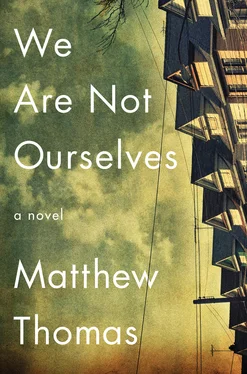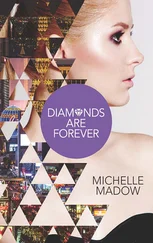The morning after Thanksgiving of 1998, Connell went up to the home alone. After his visit, he got halfway down the hall before he headed back to his father’s room and stood in the doorway looking in; then he left again. When he was about to turn the key in the car, he went back in again, but this time he entered the room. He sat in the chair next to his father’s bed and took his father’s hand as though he’d just arrived.
At noon, they went to lunch. The lunchroom was noisy with women calling for help or screaming incoherently, which pierced the fog in which his father was generally lost and caused him to tremble and start in his wheelchair. Connell attributed this to his father’s chivalrous nature. The men’s screams didn’t have the same effect.
After lunch, in his father’s room, Connell quickly came to the end of everything he could think to say. He told him about how the Mets barely missed the wild card after collapsing in the final week of the season, losing five straight, and about how the Yankees won the World Series again after winning the most games in regular season history. He told him how his last year of college was going. There was no way to tell whether his father understood anything. When his mother was there it was easier. She spoke as if he might answer her at any moment. She would tell him something that had gone wrong at the house and say, “You always told us not to do that,” or “You knew that already, didn’t you?” But he couldn’t bring himself to speak rhetorically to his father. He couldn’t suspend his disbelief that his father would answer, and he felt like he was disrespecting him if he phrased his sentences as questions. He sat with him in silence instead or put music on.
The room was quiet, peaceful. A small piano on Mr. Huggins’s side was the resting place for a flowerpot and a pair of framed pictures. He had never seen Mr. Huggins sit down at it, but then Mr. Huggins was almost never in the room. He walked the halls endlessly, pushing his walker as though trying to wear himself out.
“You know Mr. Huggins is German? I know I’ve told you about Berlin, but let me tell you about it again. Berlin is great. The art, the culture, the literature. The whole city is a construction site. They’re making everything new. They’re also trying not to make anything new, in the sense that they’re unwilling to paper over anything in the past without tremendous deliberation. They’re trying to deal with the legacy of the past in a thoughtful way. It’s not perfect, and they know they’ll never live down the atrocities of the Nazi era, but they’re trying to be the world’s historian, or at least the world’s agonized conscience. They look relentlessly inward. They guard ruthlessly against historical revisionism or sentimentality about the old ways of life or anything that smacks of even the slightest hint of the kind of thinking that led them down the road to hell. Sure, there are some neo-Nazis there, just as there are racists and xenophobes anywhere, but as a culture, at least the intellectual culture, they are tremendously deliberate about quashing that sort of thing before it gains a foothold. You can’t accuse the Germans, or at least Berliners, or at least intellectuals in Berlin, or at least the intellectuals at the Freie Universität that I came to know — you see? I learned from them to qualify my statements down to the point of the granite and the unassailable — of trying to pretend the Nazis never happened. They even guard against the idea of getting angry at having to be so thoughtful and conscience-stricken all the time. There’s a kind of unwavering discipline about their watchfulness about conscience fatigue. Consciousness fatigue. Conscientiousness — no; they wouldn’t say conscientiousness; that suggests something of ‘good manners.’ They’re almost brutal to themselves in their unwillingness to feel good about the fact that they remember to feel bad about the evils committed in the past, before they were born. They admit their lack of discipline and prosecute it even when it’s not there. We could learn a thing or two from them about how to address the legacy of slavery, or the treatment of Native Americans, or the Japanese internment camps, or Jim Crow, or the Tuskegee syphilis experiment, or any number of atrocious episodes that leave a stain on the soul of America.”
They sat in silence again until he put on some Mozart from the boxed set he had bought his father as an early Christmas present. He had decided not to fly back for Christmas that year, though he hadn’t told his mother yet. He figured it would force her to accept the invitation to the Coakleys’ instead of spending another depressing Christmas Eve at Maple Grove, as she had the previous year, when he’d been in Germany. If he came home she’d want the three of them to spend it together, and he didn’t want to do that to her, so he was going to force her hand, make her let someone — Cindy, whoever — take care of her for a change.
His father began to clap and cheer in the middle of a movement, and Connell clapped along, which reminded him of sitting next to his father in Carnegie Hall as a kid, when he would watch for his father’s hands to come together with authority to know when he himself should clap.
At the end of one movement — a check of the liner notes revealed the symphony to be Mozart’s fortieth — his father smiled deliriously and then started sobbing deeply enough that it was impossible to hear the music. Connell couldn’t tell if it was the symphony making him react so strongly or else something bubbling up from his unconscious mind. He began to get unaccountably angry. Rather than let that feeling come to the fore and allow the visit to turn ugly, he wheeled his father out to the television room and left, this time for good.
For weeks, she had seen the end coming. His color was ashen, his breath sulfuric. His gaze was vacant, without any bouts of clarity. His head was stuck in a permanent loll, as if the muscles in his neck had stopped working. The clonic twitches almost flung him out of his seat.
A month before he died, he did something that she turned over in her mind later whenever she wondered how much he was aware of in his last days. He often exhibited what looked like glimmers of awareness, but she knew they were more likely her own projections. It was less painful to believe he couldn’t remember all he’d lost, but another part of her — she knew it was selfish — wanted him to know who she was.
A few days before Valentine’s Day, she was wheeling him down the hall to his room. The home was decorated with pink streamers and heart-shaped cardboard cutouts, as though it were not a facilitator of human expirations but a middle school full of yearning adolescents. She had to walk close to the wall to avoid someone being wheeled in the other direction, and in that instant, Ed had reached out to one of the hearts on the wall and plucked it off. Reached was too strong a word; likely it brushed against him and his hand closed around it reflexively. He clutched it the whole way down the hall and into the room. It was only when she wheeled him into place and sat beside him that he dropped it and it fell on the floor between them. His hand twitched after it; he could almost have been pointing. She picked it up. She was on the verge of asking if it was for her when she realized she didn’t want to hear the lack of an answer, so she just placed it on the nightstand.
Glue pooled in the corners of his mouth and a pasty spackle of plaque sat on his teeth, which could no longer be cleaned effectively and which had darkened so considerably that they had gone past yellow to a necrotic shade of blue.
She wet a paper towel and wiped his face. “Happy Valentine’s Day,” she said, and when she kissed him on the mouth for the first time in longer than she liked to remember, she was surprised at how sweet he tasted.
Читать дальше
Конец ознакомительного отрывка
Купить книгу












